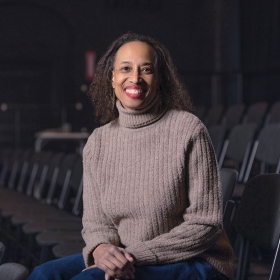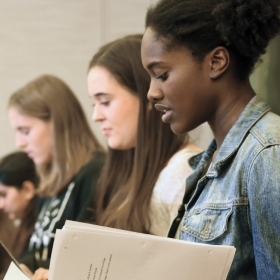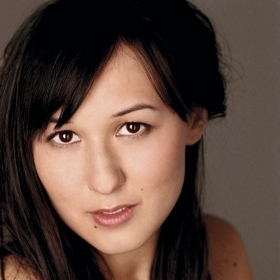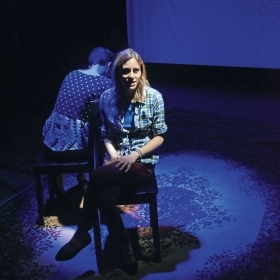“We’re all in one big stream. Everyone is trying to find a way to be heard,” says Lois Roach, senior lecturer in theatre studies. In Roach’s course THST 106: Speaking Truth to Power, her students learn to speak up while hearing out other perspectives.

Photo by Lisa Abitbol
“We’re all in one big stream. Everyone is trying to find a way to be heard,” says Lois Roach, senior lecturer in theatre studies. In Roach’s course THST 106: Speaking Truth to Power, her students learn to speak up while hearing out other perspectives. “Many students take the class because they want to get better at public speaking,” she says, but students also learn what a speech is, what a speech can do, and how to speak for someone else.
Speaking for others is “part of the journey of empowering people,” says Roach, and it’s a through-line that arcs across Roach’s career, from her playwriting to her courses to the inception of Let Me Speak (a performance that occurs during new student orientation, and which she directed in its first five years). In each instance, Roach’s work has focused on lifting up others’ voices and making them feel powerful enough to stand on their own.
Speaking itself is an act of self-empowerment, Roach argues, which then feeds back into the community: “The rhythm of speaking [asks], ‘How do you empower yourself so you can begin to empower other people?’” But it all “starts with having something so under your skin that you have to sit down and do something with it.”
Doing something with it, not sitting by complacently but standing up to speak when the call is there, “That’s what my students teach me: Are you ready when someone says, ‘Who’s up?’ And are you able to deal with all the fear and anxiety so that you can be ready?” Roach knows that her students will go on to change the world, and she wants to help equip them for the job.
One assignment in particular has resonated recently with Roach. Called “My Eulogy,” it asks students to, you guessed it, write their own eulogy. She frames it in terms of joy and celebration: “What would you do if you couldn’t fail?” she asks them, “What do you want to be known for? How do you hope to change the world?”
The assignment can be challenging. One student pushed back on the exercise, pointing out that eulogies might also contain sadness, anger, or pain. “But she said that after she flipped the script on me and the entire class,” Roach says, “after she gave a eulogy for a friend she lost at a young age.” Roach remembers that “her words were so beautiful and haunting she left the room speechless.” This student found a way to speak for someone no longer here, giving voice to the voiceless, literally speaking truth to power: “Because power isn’t just this big esoteric thing. Power in that moment was this student deciding to use her words in a way that gave new meaning to the assignment,” Roach says.
Ultimately, in Speaking Truth to Power, students learn that the fact of having a voice—in any venue or format—means having the power to connect with other people, and to stand up for themselves and for others. “If you commit to the journey,” Roach tells them, “the audience will go with you.”
[substory:1]


